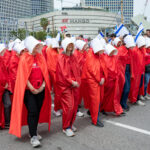Summary: Two centuries after the event, a new film commemorates the Peterloo massacre of workers by British troops in Manchester, UK. – Editors.
A troop of cavalry, wielding sabres, charge into a peaceful mass meeting. 18 people are killed, 700 severely injured. The date is 16 August 1819; the place, St Peter’s Field, Manchester, England; the occasion, a rally to demand universal male suffrage. Ever since, the massacre has been known as Peterloo, compared in bitter irony with the Battle of Waterloo four years before.
Now, two hundred years later, the story is retold in the film Peterloo (2018), directed by Mike Leigh.
Victory over Napoleon cleared the way for a century of world domination by the British empire. Coal, steam and the factory system were turning Britain into the first country of industrial capitalism. The county of Lancashire and the city of Manchester were at the forefront of the industrial revolution. While the economy was modernising fast, the political system was frozen in the past. The vote was a privilege enjoyed by only two percent of the population. Parliament was dominated by wealthy landowners. The working class was doubly burdened by economic depression and political repression. Unions were outlawed under the Combination Act. Out of this situation, a popular movement for democratic reform arose.
The lead-up to the mass meeting and massacre are viewed through the experiences of various characters. We follow two fictional characters who represent the working-class rank and file: Joe, a young soldier returning from Waterloo in a state of shock (in today’s terms, post-traumatic stress disorder); and his mother, Nellie (played by Maxine Peake). Meanwhile, the leadership is represented by the actual historic figures of Samuel Bamford and Henry (“Orator”) Hunt.
Hunt is presented as a charismatic leader who is determined to bring the movement under his own control and has an unshakeable belief in his own ability to think and speak for the masses. He uses his prestige as a speaker to sideline his fellow leaders. Hunt is entirely committed to legal and non-violent methods. When Bamford suggests that some of the marchers should carry cudgels to defend themselves and others, Hunt overrules him. Hunt is nevertheless dedicated and brave, willing to go to prison for the cause.
As the big day approaches, the film rings true about the differences and tensions within the movement, the uncertainties, arguments and anxieties.
Women set up their own organisation, the Manchester Female Reform Society, though its goal is to support their menfolk in getting the vote, not to demand it for themselves. When Nellie goes to a meeting, she interrupts to complain that she doesn’t understand what the middle-class leaders are talking about. While the leadership deal in abstract terms of liberty, right and justice, Nellie’s concerns begin with the everyday problem of feeding herself and her family. The Corn Laws, which set a tariff on imports of grain, keep food prices artificially high in a time of scarcity and hunger. This is an advantage to the landowning class, but a burden on the poor. The landowners control Parliament. To change the law, working people must first get themselves the vote.
An early scene takes us inside a cotton mill, with the deafening clatter of row upon row of power looms. Later, on the day of the demonstration, we see the same mill silent and still.
A sequence of courtroom scenes shows the ruthlessness of the law in defending private property. The penalties meted out for petty theft include whipping and transportation to a penal colony in Australia. One man, who has stolen a coat, is referred by the magistrate to the higher court of Quarter Sessions, which can sentence him to be hanged.
In the film, the workers’ homes look cramped and spartan, but perhaps unrealistically clean and dry, and filmed in soft lighting to simulate candlelight they even have an austere beauty. The real thing would likely have been damper and grimier.
On the government side, the prime minister Lord Liverpool and home secretary Lord Sidmouth are portrayed quite convincingly. They are deeply committed to the existing order, fearful of radical change, lack any understanding of the problems and aspirations of the lower classes and fear them as a rabble. Other characters seem somewhat caricatured. Spies lurk so suspiciously that it is a wonder they are not spotted immediately. The portrayal of the Prince Regent is perhaps closer to the grotesque caricatures of the time than to the real person.
When Orator Hunt at last gets to deliver his much-anticipated speech, Nellie is too far back in the crowd to hear a word of it. Unconcerned, she chats instead to the family standing next to her. This amused me because it is so like my own experience of big demonstrations.
We see members of the Manchester and Salford Yeomanry drinking before the massacre, but the film does not indicate who these men were. The Yeomanry were volunteers, not regular soldiers. Typically, they were owners of small businesses, including shopkeepers and publicans. In politics they were mostly Tories. On getting orders from the local magistrates to disperse the crowd, the Yeomanry seize the opportunity to settle scores with the Radicals, and behave far more violently than the regular troops.
Peterloo reminds us that the democratic rights we have today – the vote, and the right to demonstrate – were won through struggle and sometimes paid for in blood. The struggle against poverty and rampant inequality has not yet been won.






0 Comments